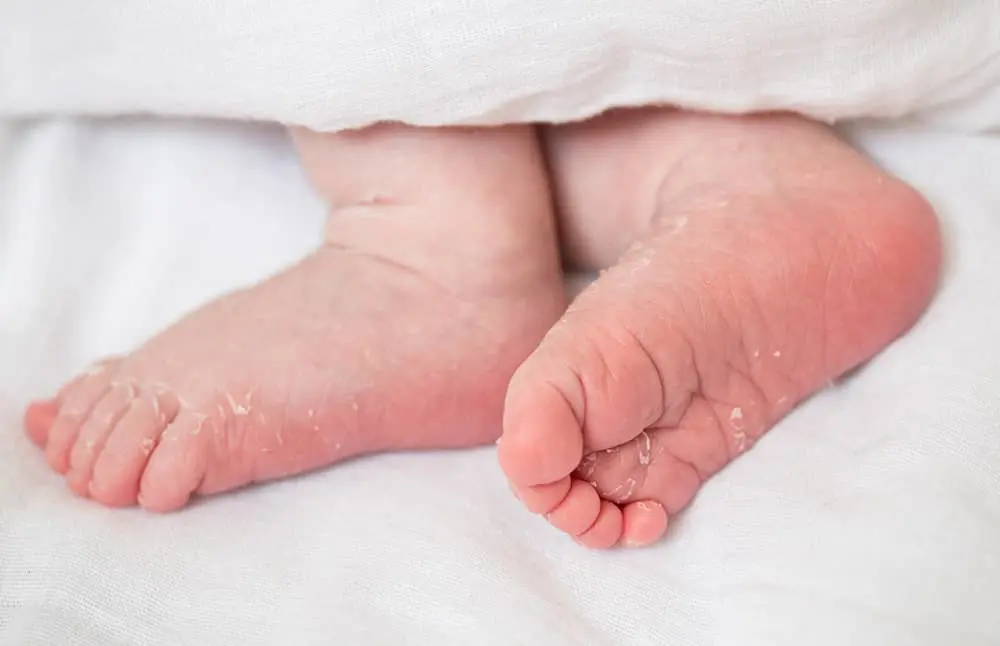New parents and other caregivers frequently express concern about their newborns’ have skin, since most people assume that newborns have pristine, velvety skin. One main concern that parents encounter is skin peeling; however, this, in most cases, is normal and shouldn't be a reason for alarm.
What Causes Baby’s and Newborn’s Skin to Peel1?
Peeling newborn skin is often a normal side effect of pregnancy, where babies have been encased for nine months within the amniotic fluid. Hence, their skin does not exfoliate like adults' skin. The possibility of skin peeling may be influenced by the following factors:
- The vernix2
A thick, waxy layer known as vernix caseosa, or vernix, forms on a baby's epidermis during pregnancy to shield it from amniotic fluid. This natural biofilm may also aid in the baby's skin's adaptation to life outside the womb if parents refrain from washing the vernix off the infant right away after delivery.
- Full-term birth
The baby's gestational age at delivery will determine how much of the skin peels. Compared to newborns born closer to term or after more than 40 weeks, preterm babies or those born before 40 weeks are likely to have less skin peeling. More time spent in the womb results in less vernix at birth, indicating increased skin exposure to amniotic fluid for newborns. Skin peeling may get worse as a result of this.
- Other causes
Although the most frequent reason for a newborn's skin to peel is exposure to amniotic fluid, there are several other potential reasons that include skin-related conditions, such as eczema3, psoriasis4, and ichthyosis5, among others, and that require you to consult with your baby’s healthcare provider.
Hence, it is important to keep an eye out for any new symptoms. A baby has to be seen by the doctor if the skin is red, itching, or swollen or if the baby develops fever,
What are some home remedies for babies' and newborns' skin peeling?
To assist in preserving a newborn's skin, you might employ a variety of homemade remedies. These include the following:
1. Minimizing contact with cold air
Since cold air is frequently quite dry, it can also cause skin to become dry. Peeling and skin fissures may result from this. Reducing the amount of time a newborn spends in chilly air can help avoid skin peeling.
2. Using a humidifier
Humidifiers help to prevent dry, itchy skin by increasing the amount of moisture in the room and reducing dry air.
3. Setting a time limit for using the bathtub
A baby's skin may not respond well to baths. Extended time spent in the bathtub might remove the baby's natural oils, making them more prone to skin peeling. Bath time should be kept to no more than ten minutes, and harsh soaps should not be used.
4. Using lukewarm water to clean the baby
The best water to wash a baby's skin is lukewarm. The skin might get dry with hot water. After taking a warm bath, it might also be advantageous to apply moisturizer right away.
5. Applying moisturizer to your baby’s skin
Moisturizers specifically designed for a baby's delicate skin are available for purchase by parents and caregivers. Use a moisturizing lotion that is hypoallergenic two or three times a day.
6. Steer clear of needless chemicals
A newborn's skin is extremely delicate. Skin irritation can occur when chemicals, such as those found in perfumes or scented soaps, come into contact with the skin.
7. Dressing appropriately
Parents should use detergents devoid of superfluous smells to clean their baby's clothes in addition to washing them with fragrance-free soaps. This may lessen the chance of further chemical exposure. Babies should also wear loose-fitting, soft clothing made of natural fabrics since it is less likely to irritate or push against their skin.
8. Ensuring that your baby is hydrated
Making sure that babies don't become dehydrated is another technique to stop skin peeling. Up to the age of six months, newborns should be adequately hydrated with breast milk or formula.
In summary, newborn skin peeling is rather normal and typically not a reason for alarm. Home remedies may typically be used for treatment, and medical involvement is rarely required. It is recommended to take a newborn to the doctor if their skin seems cracked, itching, or swollen. If not, refer to the aforementioned remedies to safeguard your baby’s skin and prevent a relapse of the skin peeling.
Refrences:
Moms around the world trust JOHNSON’S® to care for their babies
We are committed to working with moms, healthcare experts, and scientists to ensure our products continue achieving the highest standards in safety, quality, and care.
